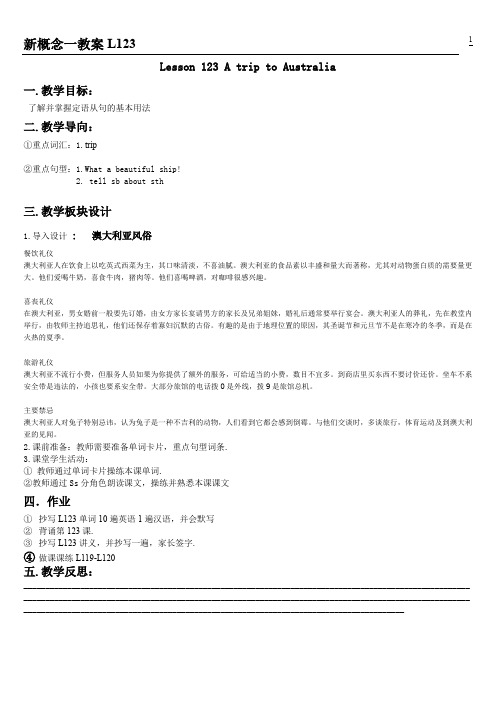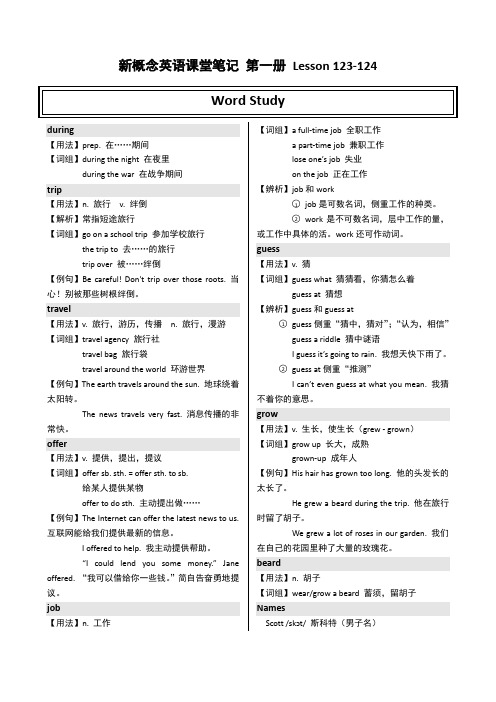新概念第一册123课笔记教学提纲
新概念英语第一册123课教案

新概念英语第一册123课教案Lesson 123: The environmentAims:- To introduce and practice vocabulary related to the environment- To encourage students to discuss environmental issues- To develop listening, reading, and speaking skills in EnglishLevel: BeginnerMaterials:- Textbook: New Concept English, Volume 1Procedure:1. Warm-up (5 minutes)- Greet the students and ask about their day.- Engage the students in a short conversation about the environment. Ask questions like:- What do you know about the environment?- Do you recycle? Why or why not?- What are some environmental problems in our city/country?2. Vocabulary Introduction (10 minutes)- Present the following vocabulary terms related to the environment: pollution, recycling, waste, renewable energy, deforestation, climate change, greenhouse effect.- Use visual aids or real-life objects to help the students understand the meaning of each term.- Engage the students in pronunciation practice of each vocabulary word.3. Listening Activity (15 minutes)- Play an audio recording of a conversation related to the environment.- Ask the students to listen carefully and answer the following questions:- What are some causes of pollution mentioned in the conversation?- How can we reduce waste?- What are the consequences of deforestation?- Discuss the answers as a class and encourage students to share their thoughts on the topic.4. Reading Comprehension (15 minutes)- Provide the students with a short reading passage about climate change.- Ask the students to read the passage silently and answer the comprehension questions related to the text.- Discuss the answers collectively and allow students to ask questions or share their opinions.5. Speaking Activity (20 minutes)- Divide the class into pairs or small groups.- Provide each group with a list of discussion questions related to the environment. Sample questions include:- What can individuals do to help protect the environment?- How can governments contribute to solving environmental problems?- Describe an environmental issue in your country and suggest possible solutions.- Instruct the students to discuss the questions within their groups and take turns sharing their ideas.- Monitor the groups and provide assistance if needed.6. Wrap-up (5 minutes)- Recap the main points discussed during the lesson, emphasizing the importance of environmental protection.- Encourage students to apply their knowledge and actively contribute to preserving the environment, both individually and collectively.- Thank the students for their participation and effort.Note: This lesson plan can be adapted and modified according to the specific needs of the students and the available teaching resources. The aim is to create an interactive and engaging environment that promotes language learning within the context of environmental awareness.。
新概念1L123-L124教案

他表示愿意帮助我一起做我的研究论文。
‘I could lend you some books,’ Jane offered.
“我可以借你一些书,”简自告奋勇地提议。
5 guess
v. 猜
例句:Can you guess the height of the tree?
你能猜出这树的高度吗?
I can guess what will happen next.
What a heavy rain it is! 多大的一场雨啊! 法
What a great surprise it is! 这多么令人惊奇啊! What a rich breakfast it is! 多么丰盛的一顿早餐啊!
【句型二】How + 形容词 / 副词 + 主语 + 谓语!
How well you look! 你气色真好! How kind you are! 你心肠真好! How beautifully you sing! 你唱得真好听! Strawberries! How nice! 草莓! 多好呀! How clever the boy is! 这个男孩多么聪明啊! How fast he runs! 他跑得多么快啊! 【说明】how 还可以修饰动词构成感叹句,但动词不提前。如: How I want to be a doctor! 我多么想成为一名医生啊! How she dances! 她跳得多好啊!
【说明】 在感叹句中,What a / an 常用来修饰单数可数名词,若其前面的形容词为元音开头,则用 an。 what 是用来修饰复数可数名词和不可数名词。但有些不可数名词,如 rain, surprise, breakfast, lunch 等,当 前面有形容词修饰,使抽象名词具体化时,则要用 what a / an,如: 语
新概念英语第一册Lesson123~128自学笔记精讲解析

新概念英语第一册Lesson123~128自学笔记精讲解析新概念英语第一册Lesson123~124自学笔记精讲解析1.What a beautiful ship!多漂亮的轮船啊!what引导的感叹句通常是由 What + a(n)+形容词+名词构成的。
2.That’s right.对。
这句是对上面附加疑问句的回答。
上面一句虽用否定形式提问,但回答则根据事实来决定是用肯定或是否定形式。
That’s right是肯定的回答,相当于Yes, it is(那正是我)。
3.grow a beard,留胡子。
4.shave it off,把胡子刮掉。
it指 a beard。
5.定语成分standing behind the counter和 repairing the road 是现在分词短语,作后置定语,分别修饰 The man, The woman 和The men。
I served yesterday 和I saw yesterday 是定语从句,分别修饰the man, the woman和the men。
此处关系代词 whom 省略了。
I bought yesterday和I found in the garden是定语从句,分别修饰 the book, the books和 the kitten。
关系代词 which或 that 省略了。
新概念英语第一册123-124课语法知识点 Grammar in use定语从句中的省略当关系代词代表主语并且从句中的谓语动词是(现在)进行时态时,关系代词及助动词be均可省略。
如果关系代词在从句中代表宾语,则往往可以省略。
此外,定语从句可用介词结尾。
请分别看以下的例句:The woman standing behind the counter served me.站在柜台后边的那位妇女为我服务/招待了我。
This is the book I bought yesterday.这就是我昨天买的那本书。
新概念英语第一册123课课文

新概念英语第一册123课课文摘要:I.引言- 介绍新概念英语第一册123课课文II.课文概述- 描述课文内容- 介绍课文中的角色和场景III.课文详细内容- 分析课文中的句子和语法- 解释生词和短语- 介绍课文中的语言点和表达方式IV.课文背后的文化内涵- 分析课文中的文化元素- 介绍课文中涉及的文化背景和习惯用语V.总结与反思- 总结课文的主要内容和语言点- 提出如何更好地应用课文中的知识和技能正文:I.引言新概念英语第一册123课课文是一篇有趣的故事,通过描述一个购物场景,介绍了英语中的一些基本语法和词汇。
本篇文章将详细介绍这篇课文的内容、语言点和背后的文化内涵。
II.课文概述这篇课文讲述了一个人去商店买东西的故事。
故事中,一个人向售货员询问关于苹果和香蕉的价格,然后选择购买苹果。
在这个过程中,课文涉及了英语中的一些基本语法和词汇,如动词的一般现在时、疑问句和回答、以及一些日常购物用语。
III.课文详细内容课文中的句子和语法结构都比较简单,主要由一般现在时构成。
例如,“I like apples.”(我喜欢苹果。
)和“You like bananas.”(你喜欢香蕉。
)等。
此外,课文还涉及了一些疑问句和回答,如“How much are the apples?”(苹果多少钱?)和“They are two yuan.”(它们是两元。
)等。
课文中的角色和场景都比较简单,主要由一个人和售货员组成。
故事发生在一家商店里,描述了一个人在购买水果的过程。
IV.课文背后的文化内涵这篇课文中涉及了一些文化元素,例如购物场景、价格和货币单位等。
在英语国家,购物是一种常见的日常活动,而商店也是人们经常光顾的地方。
此外,英语中常用的货币单位是英镑和美元,而课文中使用的“yuan”则是中国人民币的单位,这也是一个有趣的文化差异。
V.总结与反思通过学习这篇课文,我们可以学到一些基本的英语语法和词汇,例如一般现在时、疑问句和回答等。
新概念英语第一册课文翻译及学习笔记Lesson123

新概念英语第一册课文翻译及学习笔记Lesson123【课文】MIKE: Look, Scott. This is a photograph I took during my trip to Australia.SCOTT: Let me see it, Mike.SCOTT: This is a good photograph. Who are these people?MIKE: They're people I met during the trip.MIKE: That's the ship we travelled on.SCOTT: What a beautiful ship!SCOTT: Who's this?MIKE: That's the man I told you about.Remember?SCOTT: Ah yes. The one who offered you a job in Australia.MIKE: That's right.SCOTT: Who's this?MIKE: Guess!SCOTT: It's not you, is it?MIKE: That's right.MIKE: I grew a beard during the trip, but I shaved it off when I came home.SCOTT: Why did you shave it off?MIKE: My wife didn't like it!【课文翻译】迈克:看,这是我到澳大利来旅行时拍的一张照片。
斯科特:让我看看,迈克。
斯科特:这是一张很好的照片。
这些人是谁。
迈克:他们是我旅行时理解的人。
迈克:这是我们所乘的那条船。
斯科特:多漂亮的船啊!斯科特:这是谁?迈克:这就是我跟你说过的那个人。
裕兴新概念第一册笔记(123-124)

Lesson 123 A trip to Australia 澳大利亚之行New Words and expressions 生词和短语during prep. 在……期间trip n. 旅行travel v. 旅行offer v. 提供job n. 工作guess v. 猜grow (grew, grown) v. 长,让…生长beard n. (下巴上的)胡子,络腮胡子during prep. 在…期间eg. It rained during the night.下了一整夜的雨。
She kept on talking during the meal。
整个用餐时间她讲个不停。
I went swimming in the sea twice during the vacation.体假期间,我到海水浴场游泳两次。
during 与for during 与表“何时“的用语连用,for则与表”时间的长度“连用eg. I was in hospital during June.我在6月间一直住院。
I was in hospital for a month.我住院一个月。
during 与in 表示在某个时间所发生的事,during和in 二者均可用eg. We’re going on holiday during August. = We’re going on holiday in August.我们在8月要去度假。
trip n./ v.1) n. 旅行a bus trip 汽车旅行a business trip 出差go on a trip 出去旅行take a honey moon trip to Hawaii 到夏威夷蜜月旅行eg. My father will make a trip to New York next week.父亲下礼拜要到纽约去。
take a trip 观光旅行(美)make a trip 商务或办事的旅行(美)go on a trip=make a trip=take a trip 去旅行arrange a trip = organize a trip = plan a trip 计划旅行a fielf trip 实地考察a round trip 往返旅行make a side trip to (旅途中)顺路a sightseeing trip 观光旅行a trip to school 上学a trip to the office 上班a trip of the tongue 失言2)v. 绊倒trip over 被…绊倒eg. She tripped over the carpet and fell.她被地毯绊倒。
新概念英语L123-124教案

新概念一教案L123 1Lesson 123 A trip to Australia一.教学目标:了解并掌握定语从句的基本用法二.教学导向:①重点词汇:1.trip②重点句型:1.What a beautiful ship!2. tell sb about sth三.教学板块设计1.导入设计: 澳大利亚风俗餐饮礼仪澳大利亚人在饮食上以吃英式西菜为主,其口味清淡,不喜油腻。
澳大利亚的食品素以丰盛和量大而著称,尤其对动物蛋白质的需要量更大。
他们爱喝牛奶,喜食牛肉,猪肉等。
他们喜喝啤酒,对咖啡很感兴趣。
喜丧礼仪在澳大利亚,男女婚前一般要先订婚,由女方家长宴请男方的家长及兄弟姐妹,婚礼后通常要举行宴会。
澳大利亚人的葬礼,先在教堂内举行,由牧师主持追思礼,他们还保存着寡妇沉默的古俗。
有趣的是由于地理位置的原因,其圣诞节和元旦节不是在寒冷的冬季,而是在火热的夏季。
旅游礼仪澳大利亚不流行小费,但服务人员如果为你提供了额外的服务,可给适当的小费,数目不宜多。
到商店里买东西不要讨价还价。
坐车不系安全带是违法的,小孩也要系安全带。
大部分旅馆的电话拨0是外线,拨9是旅馆总机。
主要禁忌澳大利亚人对兔子特别忌讳,认为兔子是一种不吉利的动物,人们看到它都会感到倒霉。
与他们交谈时,多谈旅行,体育运动及到澳大利亚的见闻。
2.课前准备:教师需要准备单词卡片,重点句型词条.3.课堂学生活动:①教师通过单词卡片操练本课单词.②教师通过Ss分角色朗读课文,操练并熟悉本课课文四.作业①抄写L123单词10遍英语1遍汉语,并会默写②背诵第123课.③抄写L123讲义,并抄写一遍,家长签字.④做课课练L119-L120五.教学反思:______________________________________________________________________________________________________ ______________________________________________________________________________________________________ _______________________________________________________________________________________。
新概念课堂笔记 第一册 Lesson 123-124-word文档

新概念英语课堂笔记第一册Lesson 123-124during【用法】prep. 在……期间【词组】during the night 在夜里during the war 在战争期间trip【用法】n. 旅行v. 绊倒【解析】常指短途旅行【词组】go on a school trip 参加学校旅行the trip to 去……的旅行trip over 被……绊倒【例句】Be careful! Don't trip over those roots. 当心!别被那些树根绊倒。
travel【用法】v. 旅行,游历,传播n. 旅行,漫游【词组】travel agency 旅行社travel bag 旅行袋travel around the world 环游世界【例句】The earth travels around the sun. 地球绕着太阳转。
The news travels very fast. 消息传播的非常快。
offer【用法】v. 提供,提出,提议【词组】offer sb. sth. = offer sth. to sb.给某人提供某物offer to do sth. 主动提出做……【例句】The Internet can offer the latest news to us. 互联网能给我们提供最新的信息。
I offered to help. 我主动提供帮助。
“I could lend you some money.”Jane offered. “我可以借给你一些钱。
”简自告奋勇地提议。
job【用法】n. 工作【词组】a full-time job 全职工作a part-time job 兼职工作lose one’s job 失业on the job 正在工作【辨析】job和work○1job是可数名词,侧重工作的种类。
○2work是不可数名词,层中工作的量,或工作中具体的活。
- 1、下载文档前请自行甄别文档内容的完整性,平台不提供额外的编辑、内容补充、找答案等附加服务。
- 2、"仅部分预览"的文档,不可在线预览部分如存在完整性等问题,可反馈申请退款(可完整预览的文档不适用该条件!)。
- 3、如文档侵犯您的权益,请联系客服反馈,我们会尽快为您处理(人工客服工作时间:9:00-18:30)。
Lesson 123 Betty1.during 介词在...期间It rained during the night. 下了一整夜雨。
She kept on talking during the meal.整个用餐时间她讲个不停。
I went swimming in the sea twice during the vacation.休假期间,我到海水浴场游泳两次。
during 与forduring与表“何时”的用语连用,for则与表“时间的长度”连用。
I was in hospital during June. 我在六月间一直在住院。
I was in hospital for a month. 我住院一个月。
during与in表示在某个时间所发生的事,during与in两者均可。
We’re gong on holiday during/in August. 我们在8月要去度假。
2.trip n/v①n.旅行a bus trip 汽车旅行 a business trip 出差go on a trip 出去旅行Take a honey moon trip to Hawaii. 到夏威夷蜜月旅行。
My father will make a trip to New York next week.父亲下礼拜要去纽约去。
take a trip 观光旅行(美)make a trip 商务或办事的旅行(美)arrange a trip /organize a trip/ plan a trip 计划旅行a field trip 实地考察 a round trip 往返旅行make a side trip to (旅途中)顺路去a sightseeing trip 观光旅行 a trip to school 上学 a trip to the office 上班 a trip of the tongue 失言②v. 绊倒trip over... 被...绊倒She tripped over the carpet and fell. 她被地毯绊倒。
trip up ...使...绊倒③v. 使某人说错话,失误The interviewer tried to trip me up with his question.采访人员想用他的问题是我露出破绽。
3.travel v/n(1)v. 旅行I travelled around the world last year. 我去年环游世界一周。
She has never travelled abroad. 她从未到海外旅行过。
travel light 轻装便服旅行(2)n. 旅行travel agency 旅行社business travel 旅行出差foreign travel 国外旅行party travel 团体旅行4.offer v. 提供offer a bribe to 向...行贿offer后接双宾语offer sb. sth.=offer sth. to sb. 对...提供...She offered him a cup of tea. 她给他一杯茶。
He offered his help to me.他表示愿意助我一臂之力。
offer one’s help to...5.job n.(1) n. 工作--What does he do? /what’s his job? /What’s he?-- He has a job in a book-store.It is easier to find a job if you can drive. 如果你会开车就比较容易找到工作。
apply for a job/ hunt for a job 求职lose one’s job 事业quit a job 辞职(2) n. 份内事It’s your job to do the dishes. 洗盘子是你份内的事。
6.guess v.猜guess a riddle 猜谜Can you guess how much it cost? 你能猜出它花了多少钱吗?guess 后接宾语从句,从句是疑问句,用陈述Have I guessed right? Have I guessed wrong? 我猜对了吗?我猜错了吗?keep a person guessing 让人捉摸不定,不如说,让人猜7.grow v.(1)成长,长大Children grow rapidly. 小孩子长得很快。
(2)增大,变大The population of the city is growing every year. 这个城市的人口每年都在增加。
(3)变得It was growing dark. 天渐渐暗下来了。
She has grown to like studying English. 她渐渐喜欢学英语了。
grow out of 长大得不能穿My son has grown out of all his old clothes. 我的儿子已经长大,所有旧衣服都穿不了。
grown adj. 长大成人的grown-up n. 大人,成人,比adult 更口语化The child acts like a grown-up.那个小孩举止像个大人。
8.beard n. (下巴上的)胡子,络腮胡子mustache 嘴上的胡子whiskers 腮须He wears a long beard.他留了长胡须。
grow a beard 留胡须beardless adj. 无胡须的,未成熟的9.定语从句关系代词的省略如果关系代词在定语从句中代表先行词做宾语,它就可以被省略。
This is a photograph (that) I took during my trip to Australia.先行词that引导的定语从句由于先行词a photograph 在从句中做took的宾语,因此,引导从句的关系代词往往被省略。
They are people(who/whom) I met during the trip.先行词people在从句中做met的宾语,因此,引导词who或whom被省略。
That’s the ship (that/which) we travelled on.先行词ship在从句中做travelled on的宾语,因此省略了引导从句的关系代词that或which That’s the man I told you about.先行词the man在从句中做about的宾语,因此who或whom被省略。
The one who offered you a job in Australia. who在从句中做主语,因此不可被省略。
10.感叹句的结构what后面接名词,how后面接形容词和副词(1)What+a/an+adj.+可数名词单数+主谓What a foolish mistake you’ve made. 你犯了一个多么愚蠢的错误啊!What a lovely girl she is!(2)What+adj+不可数名词+主谓What pleasant weather it is!What ugly smell the room has!(3) How+adj/adv+主谓How blue the sky is! How quickly he drives!Lesson 124 Betty1.kitten n.小猫weak as a kitten 像小猫一般软弱的have kittens 坐立不安,心情烦躁Exercise A1.She is the woman(whom/who) I drove to London.2.That’s the film(which/that) I saw.3.That’s the man (whom/who) I spoke to.4.They are the thieves(whom/who) the police caught.5.These are the letters (which/that) I typed.6.There are the people (whom/who) you asked me about.Exercise B.1.I saw that man yesterday. Which man? That man? Yes, that’s the man (who/whom) I saw yesterday.2.I repaired that car yesterday? Which car? That car? Yes, that’s the car (which/that) I repaired yesterday.3.I drove that woman to London yesterday? Which woman? That woman? Yes,that’s the woman I drove to London yesterday.Exercise C.1.This is the village (that/which) you told me about.2.He is the person (who/whom) you have heard about.3.This is the test (that/which) you spoke to me about.。
